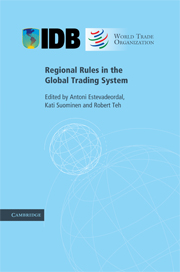Book contents
- Frontmatter
- Contents
- List of figures
- List of tables
- List of Contributors
- Foreword
- Acknowledgements
- List of abbreviations
- 1 Introduction
- 2 Big-Think Regionalism: a critical survey
- 3 Market access provisions in regional trade agreements
- 4 Trade remedy provisions in regional trade agreements
- 5 A mapping of regional rules on technical barriers to trade
- 6 Services liberalization in the new generation of preferential trade agreements: how much further than the GATS?
- 7 Mapping investment provisions in regional trade agreements: towards an international investment regime?
- 8 Competition provisions in regional trade agreements
- Appendix: List of RTAs included in the survey
- Index
Foreword
Published online by Cambridge University Press: 01 March 2011
- Frontmatter
- Contents
- List of figures
- List of tables
- List of Contributors
- Foreword
- Acknowledgements
- List of abbreviations
- 1 Introduction
- 2 Big-Think Regionalism: a critical survey
- 3 Market access provisions in regional trade agreements
- 4 Trade remedy provisions in regional trade agreements
- 5 A mapping of regional rules on technical barriers to trade
- 6 Services liberalization in the new generation of preferential trade agreements: how much further than the GATS?
- 7 Mapping investment provisions in regional trade agreements: towards an international investment regime?
- 8 Competition provisions in regional trade agreements
- Appendix: List of RTAs included in the survey
- Index
Summary
The number of regional trade agreements (RTAs) has grown enormously over the last decade. Over 200 RTAs currently in force have been notified to the World Trade Organization, with many more being currently negotiated. More and more areas, that traditionally were not part of trade agreements, are being covered by these agreements. RTAs now typically include rules on competition policy, the environment, labour, services, investments, intellectual property, trade remedies or technical barriers to trade, in addition to the usual market access provisions in merchandise trade.
The proliferation of RTAs requires increased attention to be paid to the potential conflicts and complementarities between ‘regional’ and ‘global’ rules. The relationship between regionalism and multilateralism has sometimes been framed as one where RTAs are either a building bloc or a stumbling bloc to multilateralism. But, having closely witnessed integration arrangements in Europe, Latin America and the Caribbean, Africa, Asia and elsewhere around the globe, we believe that this is not as black and white. RTAs have delivered important trade gains for their participants. But, often, they have also been a source of trade diversion and have hampered movement towards greater multilateral liberalization, as is the case with certain rules of origin. In our view, the key research question is to identify those regional rules that promote complementarities with the multilateral trading system and those that conflict with it.
- Type
- Chapter
- Information
- Regional Rules in the Global Trading System , pp. xiii - xvPublisher: Cambridge University PressPrint publication year: 2009

